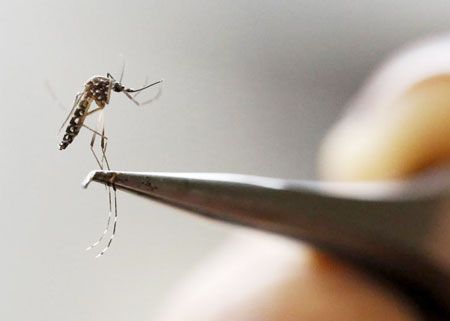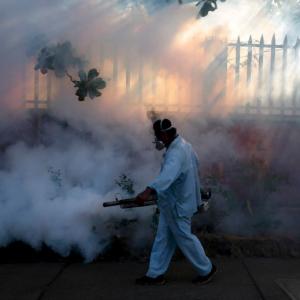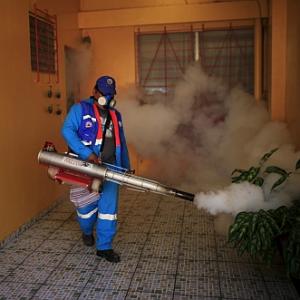Eradicating the Aedes aegypti or developing a vaccine will take years. Genetic modification offers a way out; the question is how to scale it up across continents, says Devangshu Datta.

One upside of globalisation is that goods and people move very quickly.
This is also one of the downsides. It can lead to the rapid spread of disease.
The Zika virus epidemic, which the World Health Organisation has declared a public health emergency, provides an excellent illustration of how this happens.
The disease used to be restricted to a few locales in Africa.
In 2015, cases were found in the Pacific and then across Latin America. Cases have now been found in Australia, the US and Canada. Further spread is inevitable.
The Zika virus has been known for about 70 years. It is spread by the Aedes aegypti mosquito.
That insect has a very wide distribution and it also carries dengue, chikungunya and yellow fever.
Zika is also transmitted via sexual contact. There is no cure or vaccine.
The virus is not life-threatening. In many cases, infected people have no symptoms and don't even realise they have been infected.
Symptoms, when they occur, are similar to mild dengue with fever, rash, joint pain etc. Hospitalisation is rarely needed. Patients recover with a few days of rest.
But Zika may have a horrifying effect on pregnant women.
There seems to be a link with babies born with birth defects. Specifically, if a pregnant woman is infected, there seems to be a greater chance that the baby will be born with microcephaly (Guillain-Barre Syndrome).
This means a shrunken head, an under-developed brain and disorders of the central nervous system.
Brazil, in particular, has seen a massive spurt in microcephaly births. Earlier, there used to be about 150-175 cases of microcephaly annually.
But since October 2015, Brazil has reported more than 4,000 cases.
Causation is not proved. But Zika has been found in amniotic fluid of foetuses, indicating it can cross the placenta barrier and get to foetuses in the womb.
The WHO will set up surveillance centres across 20 to 30 locations in different countries to study the possible linkages between microcephaly and Zika.
The Centers for Disease Control and Prevention in the US has issued advisories for pregnant women, asking them not to travel to 22 affected nations.
El Salvador has entered the realm of the absurd, asking women not to get pregnant until 2018. Brazil and Colombia have also requested women to avoid getting pregnant.
Controlling the spread is impossible. There are more than 1,00,000 commercial flights a day globally. Infected people and insects could also travel by ship, on cargo flights, or as refugees. Brazil hosts the Olympics this year, guaranteeing higher volumes of traffic to the region.
The WHO's declaration of emergency is a signal to buck up and focus. There are two broad ways to mitigate problems. One is to try and eradicate the Aedes aegypti; the other is to develop diagnostics tests, vaccines and cures.
Developing a new vaccine takes years. Vaccines help develop immunity by exposing the body to a dead or weakened version of a virus.
The virus must be cultured in a seed strain. Test vaccines must be developed, using attenuated or dead versions.
Then live trials are conducted, and monitored for efficacy and side effects. After approvals from health authorities, production must be scaled. In the case of Zika, there is the additional complication that the key population at risk is pregnant women.
The WHO's stance may accelerate the approvals process and encourage research. But this will still take years.
Tackling the mosquito is also difficult. It breeds in standing water anywhere. It is active during the day unlike the anopheles mosquito (the malaria carrier), which is more nocturnal. Hence, bed-nets are ineffective.
One innovative method is genetic modification.
A biotech company, Oxitec, has bred a modified Aedes aegypti mosquito carrying a gene that causes its offspring to die before they mature.
Male mosquitoes (which don't bite) are released to breed with wild females and wipe them out a generation or two later. However, scaling this up across continents will be tough.
The Indian government has made brave noises about preventing Zika. Well, we all know how effectively dengue has been combated and Zika has precisely the same vector.











